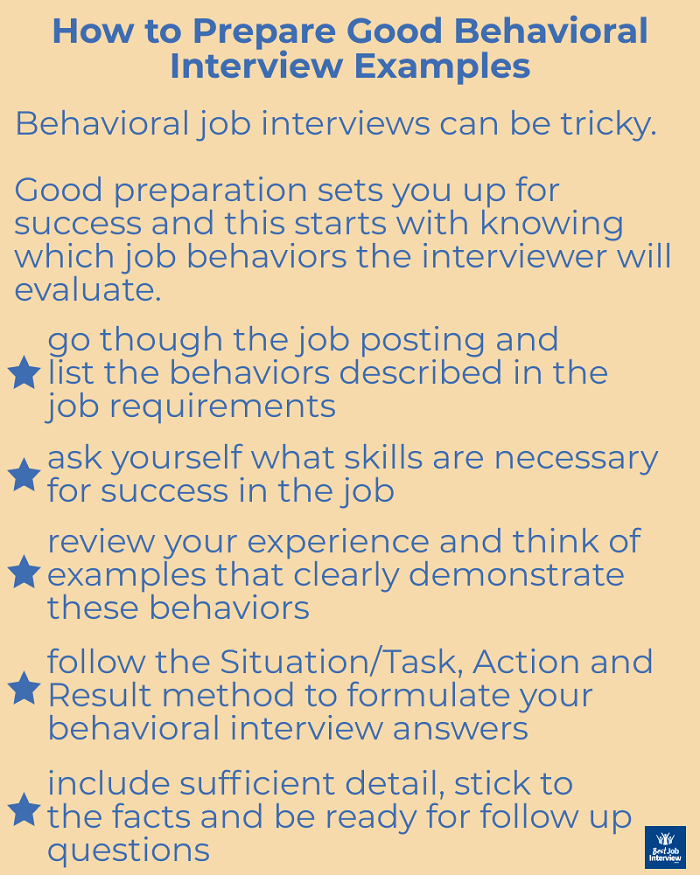- Home
- Behavioral Interview
- Steps to Success
Behavioral Job Interviews
The 10 Steps to Success
You can succeed in behavioral job interviews with these 10 straightforward steps.
How to answer difficult behavioral interview questions and manage the behavioral-based interviewing process like a pro.
These steps simplify the behavioral interview process for job candidates, making it easy to handle. Don't be caught unawares by behavioral interview techniques, know what to expect and be ready with good behavioral interview answers.
How to Ace Behavioral Job Interviews
Be confident that you are well prepared. Follow these 10 steps and stand out as the right job candidate in your next interview.
1. Prepare for common behavioral interview questions
Determine which questions you will be asked so that you can prepare good answers.
Preparing for behavioral interview questions involves analyzing the job and listing the workplace competencies and behaviors required for success in the position. Ask yourself the following questions:
- What skills are necessary to do the job?
- What makes a person successful in this type of position?
- Why would someone fail in this position?
- What are the difficult aspects of this position?
The answers to these questions indicate what behaviors the interview will explore. For example, a customer service position requires good communication skills, problem-solving ability, accuracy, adaptability and tolerance. Use this list of job-related behaviors to help you clarify the behaviors and competencies that apply to the job you are interviewing for.
Full list of behavioral-based interview questions.
2. Have good behavioral interview answers ready
Review your experience and background and think of examples that highlight your strength and skills in these areas. Use these sample answers to behavioral interview questions to help you.
3. Include sufficient detail in your answers
Be detailed and specific with the examples you use to answer the behavioral question. Avoid irrelevant ramblings or going off at a tangent. Stick to the facts and carefully outline in detail the actions you took.
4. Listen carefully to each question
If you are not sure what the interviewer is looking for, you can rephrase the question back to clarify. "Are you asking me to describe a situation where ......?" This also gives you time to think about your answer. It is quite acceptable to take a little time to formulate your response.
5. Use recent examples in your answer
The details of more recent behavioral stories will be easier to recall and the interviewer will view them as more valid.
If you have limited work experience you can use examples from internships, college or school classes and projects, sports participation, community service or your hobbies and interests.
As long as the example demonstrates the behavior that is being explored. For example if you are asked about how you have gone about resolving conflict, you can even use an example from your family life.
6. Be confident about handling negative situations
Sometimes in behavioral job interviews the question will try to find out how you responded to a negative situation. For example:
"Tell me about a time when you were unable to solve a problem the first time, what did you do?"
Prepare some examples of negative experiences, but use those that you were able to get something positive out of or learned something valuable from.
7. Vary your examples
Think of situations from different areas of your life and career. Go through your resume to refresh your memory to help you with this. Make sure each example has a beginning, middle and end. Be ready to detail the situation, the actions you took and the outcome.
8. Stick to the facts
This is key to behavioral job interviews. Exaggerating the results will be found out by the interviewer's further questioning.
Stick to a specific account of one situation or event to answer the question and avoid generalizing about several related events.
9. Be aware of your body language
During behavioral job interviews make sure your body language is congruent with your verbal communication. Sending a positive message with your non-verbal signals reinforces the positive message of the words you use in your response.
10. Practice your answers
Role-play your behavioral interview questions and answers with a friend or family member. Ask for feedback or get someone to video you. The more you practice your behavioral interview answers the more confident and comfortable you will be.
Behavioral Interview Tips Part 2
The complete behavioral interview question and answer guide for over 20 job-related behaviors
Competency based interview questions
View good interview answers to competency-based interview questions
View frequently asked situational interview questions with excellent answer guidelines and be well prepared for your job interview.




